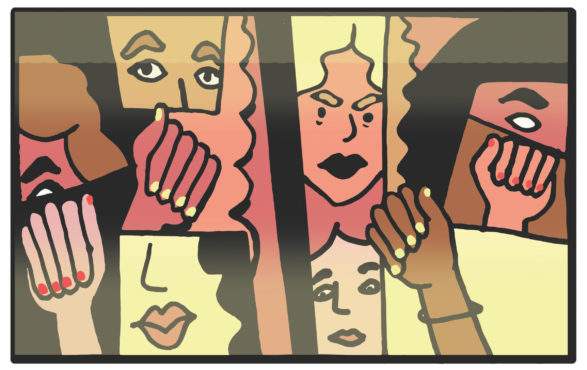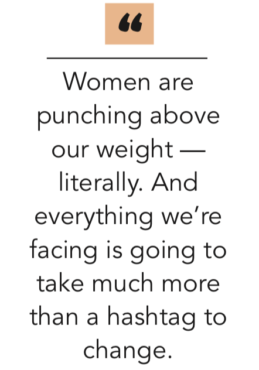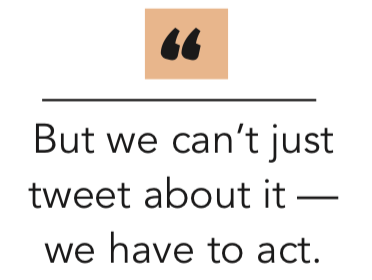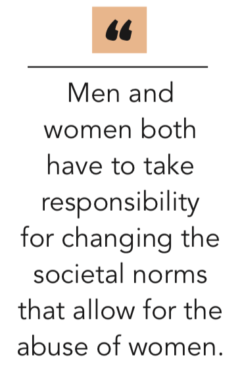
On Oct. 15, 2017, a tweet changed the world.
“If all the women who have been sexually harassed or assaulted wrote “Me too” as a status, we might give people a sense of the magnitude of the problem,” wrote Alyssa Milano, an American actress.
The resulting #MeToo movement tore back the curtain on the sexualized violence, harassment, and gender inequality that pervades modern culture. From Harvey Weinstein-style institutionalized rape to so-called bad dates à la Aziz Ansari, women have for a long time lived with the fact that many men do not see them as equal human beings. Although these issues have been made more publicly accessible through #MeToo, the movement is now a year old and we are still living with fundamental inequality between men and women.
The past year has exposed countless tales of inappropriate comments, unwanted advances, and outright attacks. This is not a rush of attention-seeking accusations. This is the unearthing of decades of systemic abuse and harassment, buried because until now, no one was willing to listen.
And that was the point of #MeToo: to expose. To force people to acknowledge that sexualized violence and harassment against women is so common and accepted that most of the time it goes unnoticed. To make the world stop and reckon with the fact that women’s status as less than equal is so normalized that even when we see the violence, we foist the blame on the victims.

Illustration by Austin Clay Willis, Design Director.
All the awareness is good. Incredible, actually. The fact that our patriarchal society is allowing discourse about sexism is a big step forward. But unless real-world change follows, the #MeToo movement will only ever be a social media phenomenon.
Bill Cosby may have been sentenced, but I am just cynical enough to believe he might have gone free if he were white. After all, Harvey Weinstein hasn’t been convicted yet, and there’s a self-professed sexual predator sitting in the oval office.
The truth is, women are combating centuries of culturally ingrained misogyny because we are the weaker sex.
Allow me to clarify. Women are physically weaker. As True Detective’s Ani Bezzerides (Rachel McAdams) said, “The fundamental difference between the two sexes is that one of them can kill the other with their bare hands.”
The character is fictional, but all the same, she speaks the truth. This reality allows men to dictate the rules of society, and for generations women have had to take it.
To quote comedian Iliza Shlesinger, “Do you think for a second that if women were physically stronger than men, we would have waited for the right to vote?”

This physical discrepancy between men and women pervades politics, social norms, and female identities, and it is a biological fact that makes the fight for true gender equality much harder.
Women are punching above our weight — literally. And everything we’re facing is going to take much more than a hashtag to change.
Our culture places the burden of avoiding harassment and assault on women. As girls we are taught to get along with others, to take a joke. We abide by dress codes that tell us to cover up our bodies, so boys will not be distracted or provoked. As adults we are encouraged to be conciliatory towards our coworkers, to avoid making a scene. We fear for our jobs and our reputations if we complain, and we feel that a confident woman should be able to handle it, anyway. We walk on well-lit streets, and we never leave our drinks unattended, because we cannot trust that the next man we meet won’t hurt us, and it is up to us to keep ourselves safe.
Women are told to modify their behaviour so as not to provoke harassment or assault, and that is wrong. The onus should be on men not to catcall, grope, coerce, or rape, but that’s not how our society operates.
As a female university student, I feel the gender divide more than some. In 2014, 47 per cent of sexual assaults were perpetrated against women and girls ages 15-24 and, if any of my female friends become a rape statistic based on those 2014 numbers, there would be a 51 per cent chance they will know their attacker.
Culturally, it is not up to men to behave themselves. Men have physical strength on their side. They do not call a friend if they have to walk alone at night, just so someone will be able to call for help if something bad happens. They do not hold their keys like a weapon walking through a dark parking garage. They do not feel the physical vulnerability that many women feel every day. Men go through life with the security and entitlement that comes with being at the top of our patriarchal structure, and this entitlement disproportionately affects women because boys will be boys.
Even in 2018, women are still lesser humans to many men. We are not equals. We are targets. We are conquests. And if we’re drunk, we’re easier to get into bed. We’ve heard the excuses over and over. She was high, she was wasted, she’s a slut, she encouraged him, she didn’t fight so she must have wanted it, she was asking for it.
In truth, we are never asking for it. Women do not cause rape. Clothing choices and intoxication do not cause rape. Rape is caused by rapists. The blame for sexual harassment and assault lies solely with the perpetrator. And yet over and over again, women are supposed to accept street harassment as the price of being female and horrific violation as something that was preventable. By us.
Even newspaper headlines shift the onus away from the perpetrator. “A woman was raped.” Not “A man raped a woman.” Both are true, but one version removes the male rapist from the scene.
There is something tragically, horribly comic about the idea of any woman “asking” for sexual violence. Sexual assault is the only crime where the temptation to commit the offence is used as a defence. Never has an accused man stood up in court, claimed justification for robbing a house because he was able to force the lock, and been acquitted because the target was easy. We do not blame the victims of robberies, but we blame the victims of rape, and this is a fundamental problem.
From a practical perspective, many men do not understand the rules of consent. Neither do many women. Canada’s laws around consent are actually quite progressive, but knowledge of what they mean has not yet trickled down to the masses. Many people simply assume that if the recipient of their attentions isn’t loudly refusing, then everything is fine.

Legally, unless everyone involved has verbally agreed to have sex, then an assault is occurring. Consent is verbal, and consent is continuous. Having sex with an overly intoxicated person is sexual assault. Pressuring someone into having sex is sexual assault. Continuing a sexual act after your partner has asked you to stop is sexual assault. Having sex with someone who has not verbally refused, but hasn’t verbally agreed either, is sexual assault. All of the above applies to people who are in committed relationships, not just casual encounters.
Unfortunately, society fails to properly teach consent, something that must change if #MeToo is going to have a real and lasting impact. Progressive laws are useless unless people believe in them and abide by them. The absence of “no” does not mean “yes.” Many women fear for their safety if they refuse or feel like they have to go along with sexual activity that they do not want because it’s just a bad date and it’s normal. Some women cannot communicate refusal because they are in a state of trauma.
Consent should not even have to be codified. Consent should be a common decency.
The simplified version is, if you aren’t getting an enthusiastic yes, then back the hell off! Check your entitlement and be considerate. And if you find that concept unreasonable, then you might be one of the reasons #MeToo is necessary.
The obvious recourse for women in an instance of sexual assault should be the justice system. However, the Canadian justice system is often more of an obstacle than a solution for sexual assault victims. While more women are reporting in the aftermath of #MeToo, social media hasn’t solved any of the problems our justice system has with handling sexual assault claims. Many police officers are uneducated on how to interview victims of trauma, put too much stock in myths about what “real” rape (a stranger leaping out from a dark alley) and “real” victims (a morally upstanding white girl with physical evidence of trauma) look like, and do not properly apply consent law. As a result, the justice system re-victimizes already traumatized women, who often do not conform to the mythical standard.
#MeToo has opened the door for women to talk about their experiences while circumventing the legal system. The movement is a cry for change that the justice system must acknowledge. In order to build trust between sexual assault survivors and the system, police need to prove they can serve and protect those who choose to come forward. Officers who deal with sexual assault cases must be appropriately trained, and lawyers must be respectful of victims in court.
Such institutional changes and societal shifts take time to implement, but they are an important investment for the future. It’s a year post-#MeToo, and not enough has changed. Here at UVic, individuals continue to express disappointment with what they perceive as sexist dress policies at CARSA, while the university’s Sexualized Violence and Prevention Policy — although a step in the right direction — has failed some students in providing support.
Still present in Canadian society is the instinct to disregard women’s allegations of abuse. We still fail to hold men accountable for their actions. We still fail as to take sexual harassment and sexual assault seriously. And we have sanitized the language so that it hides the horror. Sexual assault is rape.
Consider the excuses: allegations ruin men’s lives. She’s making it up for attention or revenge.
These are a coward’s excuses. And also, false. Allegations don’t ruin lives. Rape ruins lives. Allegations can be proven false, and the guilty men deserve what they get and more. The myth of the lying woman is exactly that: a myth. Only about 5 per cent of sexual assaults are reported to police, and of that tiny percentage, only 2-8 per cent are found to be false. It is important to remember that false accusations are a feature of all crime. People are occasionally wrongfully accused and convicted of murder, but no one is suggesting that we stop taking murder seriously because arresting someone might hurt their feelings.

The only reason sexual harassment and sexual assault are excused or ignored is because they are gendered crimes. 2014 Canadian statistics point to 87 per cent of victims as female, and 98 per cent of perpetrators as male. Our patriarchal society still values the reputations and “needs” of men over women’s rights to their own bodies. It is still more important to protect a man’s reputation, education, or career than it is to seek justice for a violated woman.
#MeToo is not a witch hunt, and the use of that term to describe the movement has thousands of burned, drowned, or hung women turning in their graves. #MeToo is a demand for recognition that what women endure is wrong.
But we can’t just tweet about it — we have to act. Men and women both have to take responsibility for changing the societal norms that allow for the abuse of women, and we all have to hold perpetrators accountable.
Men need to be feminists, too. Given that the historical definition of feminism is believing in the social, political, and economic equality of the sexes, this shouldn’t be that hard.
I learned feminism from my father. He was a soldier and a police officer, and is a parent absolutely determined that his daughters never see themselves as less than any man. And he’s not the only man I know who maintains a fundamental belief in gender equality. I have been befriended, loved, mentored, and protected by such boys and men all my life.
Many women aren’t so lucky. The individual existence of feminist men is not enough in a society that teaches good boys to treat girls as their inferiors. Gender equality is a fact of life, but not yet a cultural reality, and both men and women need to demand better. There is no place for bystanders anymore. No excuses for men incapable of questioning their own privilege.
Women can’t eradicate rape culture on our own. We are the weaker sex in a society that has for too long allowed men to be abusive at our expense. For the love of your sisters, mothers, and girlfriends: guys, we need you on our side. We need your respect, your support, your belief, and your anger at the predatory men that make your gender look bad. This is the good fight and we need you to help us fight it.
#MeToo has the potential to be the most important movement since women’s suffrage, but without real legal and societal change it will only exist on Twitter, Facebook, and Instagram. We are nowhere near finished.






